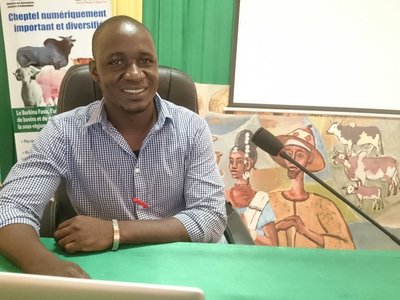

Like many people in his country, Burkina Faso, Dominique Ouedraogo came from small rural farm. In his village, located at 50 km from the capital Ouagadougou, he grew up with cattle and he has been a herder since he was 5 years old, and is now a doctor of agriculture.
When he started his primary school with 6 years until his entry to university Dominique always spent his holidays from June to September herding cattle when his parents were in charge of crop production activities. This passion for cattle led him to study agriculture with specialisation in livestock science at the University Nazi Boni of Bobo-Dioulasso, the country’s second biggest city, where he graduated with a master’s degree.
Dominique studied agriculture for his passion for animals but also to contribute to the improvement of his parents’ livelihoods and that of the 80% of the population of Burkina Faso, who rely on this activity. Dominique is currently an assistant lecturer at the University of Dédougou in Burkina Faso.
In 2017 Dominique started his PhD studies in Animal Breeding and Genetics at the University of Natural Resources and Life Sciences, Vienna (BOKU). He is an APPEAR scholarship holder pursuing his PhD research within the framework of the APPEAR project Local cattle breed of Burkina Faso – Characterization as sustainable use | LoCaBreed. The topic of his PhD thesis is “Design and implementation of a community-based local cattle breeding programme in Burkina Faso”. The aim is to implement appropriate breeding programmes which improve local cattle breeds size and their disease resistance in order to increase the interest of farmers to conserve them. The community-based breeding programme (CBBP) is a new approach adapted to smallholders’ low-put systems in developing countries where farmers are mostly illiterate and where conventional breeding failed due to lack of infrastructures and recording systems. CBBP is a participatory approach that includes farmers in all the steps of the breeding programmes, from designing to implementation. In this approach farmers are the key players and the owners of the breeding programme.
By adopting this approach the LoCaBreed project aimed to work with farmers for farmers. During the 3 years Dominique worked very closely with about 100 local farmers to define their breeding objectives. He supported them in the identification of more than 2000 animals with ear tags and he set up a recording system to evaluate the young bulls’ growth performance and to assist farmers in choosing the best reproductive bulls in order to improve the size of their cattle offspring.
Dominique Ouedraogo completed his PhD at the end of 2020 and returned to Burkina Faso to continue his academic career at the university. I have a strong ambition to become a key scientist and player in animal breeding in Burkina Faso. Staying in Austria for 3 years, I have built a strong network that will be useful for my career.” In addition to the current cattle breeding programme in rural areas he plans in the long term to set up a recording system for dairy cattle as seen in Austria. This will subsequently contribute to an improvement of milk production in Burkina Faso.
“I am convinced that genetic improvement is the key to enhancing livestock production and thus contributing to food availability for the growing population and reducing poverty in my country.”
As he learnt during his PhD study, changing the environment of animals is temporary but when you change its genotype you change it forever.
Dominique is
“grateful to Austrian Development Cooperation through OeAD and APPEAR for giving him this opportunity to study in Austria. Here I have been trained not only as a scientist but a human who will be useful to my community.”
Short video portrait of Dominique Ouedraogo and his doctoral thesis
Dominique Ouedraogo completed his doctorate with distinction at the University of Natural Resources and Life Sciences, Vienna in December 2020. His studies were financed by a scholarship of the Austrian Partnership Programme in Higher Education and Research for Development (APPEAR). Managing international projects and scholarship programmes has been one of the OeAD's core tasks for years. Thus, the OeAD is also in charge of the higher education cooperation programme APPEAR. Since 2010 APPEAR has promoted cooperation between Austrian higher education institutions and higher education institutions in the Austrian Development Cooperation’ priority countries and priority regions. The project is financed by funds of the Austrian Development Cooperation.
